Need for Social Security and Health
Despite comprising much of India’s workforce and contributing substantially to India’s GDP, informal workers are routinely undervalued and exploited. Within this socially and economically disadvantaged group, women face a double disadvantage due to cultural, educational, uniquely gendered, social barriers.
Welfare schemes, social security and health programs are intended to support and protect families who are unable to meet basic material and financial standards. However, due to systemic issues, such as illiteracy, unawareness, immobility, corruption, and cost, many of these services do not reach their intended recipients. SEWA Bharat ensures that social security and health services are delivered equally and fairly to women in the informal sector. It does so by relying on information dissemination, awareness generation, and service delivery mechanisms.
SEWA Shakti Kendras: Empowering women from the ground up
SEWA Shakti Kendras (SSKs) are a unique resource to marginalized communities in need. Deeply embedded in and trusted by communities, SSKs are accessible and experienced in fostering access to schemes and official documents, and in interacting productively and usefully with community members. All SSK staff are community members themselves and their primary activities include:
- educating local women about health, personal finance, and their rights and entitlements as Indian citizens;
- providing legal counseling and awareness sessions;
- assisting them in obtaining ID and address proofs, birth and death certificates, and other official documents; and
- connecting them to health services and government schemes, as well as to SEWA’s financial institutions and labor union.
Through SSKs we have understood that :
- Local leaders can drive efforts to establish scheme/program linkages and follow up on delivery.
- The ability to navigate a landscape of schemes and programs cannot result in lasting impact unless complemented by opportunities for real access to those schemes and programs.
By establishing a strong sense of trust with the communities they serve, over the years SSKs have been able to gain access to and support the most vulnerable members of Indian society. For instance, 63% of SSK beneficiaries are labor migrants, 56% of beneficiaries are home-based workers, and 56% of SSK beneficiaries have not been educated beyond the fifth grade or are entirely illiterate.






